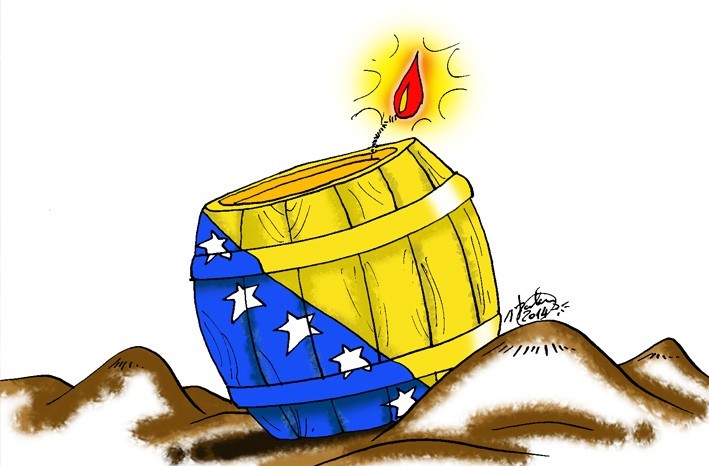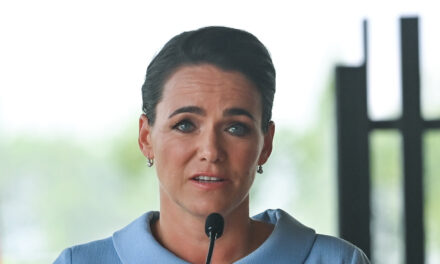At first glance, the debate that has once again sparked gunfire in the Balkans in recent weeks may seem banal. Kosovo wanted to enforce the law according to which Serbs living in the northern part of its territory should replace their Serbian license plates with Kosovo ones. Knowing the centuries-old history and complicated ethnic relations of the Balkans, however, it is by no means a coincidence that the situation turned out this way.
The peoples of the peninsula have fought with each other several times throughout history, it is no wonder that the area received the epithet "gunpowder barrel". The Balkans are strained by both religious and ethnic tensions, which have not only weakened but rather strengthened over the centuries. Most recently, it was the South Slavic war that took place in the early 1990s that sharpened the differences. And the peace treaty that was supposed to conclude it didn't settle anything reassuringly either.
As a source of tension, the tri-national Bosnia-Herzegovina and Kosovo issue remained unresolved to this day, even though the Albanian-majority state declared its independence in 2008.
Moreover, even the Croatians and Slovenians, who have since become EU members, are able to seriously differ on a territorial issue, as the example of the Piran Bay has shown in recent years. The relationships are therefore complicated and the situation is particularly difficult because, in most cases, each party has some truth behind their position. In the early 2010s, however, it seemed that there was no need for further arbitration in the Balkans.
The chance and possibility of joining the EU offered such an attractive alternative to these countries, from North Macedonia to Albania, Serbia and Montenegro to Bosnia, that it was worth putting the tensions aside.
The accession of Bulgaria, Slovenia, and then Croatia showed all states that membership of the European Union is indeed a realistic alternative. The development of these countries also served as proof that joining is worthwhile. However, after 2013, something changed. Western experts formulate this as the so-called "enlargement fatigue" has taken over the EU. Many leading politicians in the West say that the Union should now be deepened rather than expanded. Of course, let's not be so shy and translate these good-sounding sentences into Hungarian:
unfortunately, the purchasing power of these countries awaiting accession does not represent as much of an opportunity for Western companies as it would cost to develop and catch up.
Simple math, but it should be about much, much more. Moreover, about our safety. Business circles, however, are not interested in this. And the leadership in Brussels is so, so weak and has only weakened further during the crises. The financial crisis, then the migration crisis, and finally the coronavirus epidemic presented the Brussels leadership with challenges in which, let's say it openly, its knife broke. Thus, there was no energy left to carry out the further expansion even against the financial circles. In recent years, the Balkan countries stuck outside the EU have drawn two conclusions:
on the one hand, that Brussels is actually only promising them to join, and on the other hand, that it is not necessarily worth belonging to this creaky, difficult organization that operates on the basis of some oniony ideology.
Even though Olivér Várhelyi is now in the position of expansion commissioner, who sincerely wants to speed up the process, his efforts for the time being - in the absence of the support of the others - are only enough to put out the fire. It is no coincidence that both Várhelyi and the Hungarian government stand wholeheartedly in favor of the integration of the Balkan Union. As our immediate neighbors, we Hungarians understand what it is all about. And here we have to turn back to safety:
if the EU does not become a foreseeable, realistic and attractive alternative for the Balkans, then conflicts and tensions between each other will come to the fore again.
Moreover, there is no need to talk about this in the future tense, since the situation between Kosovo and Serbia is already the harbinger of the coming storm. We Hungarians know from the '90s what it's like to live in the immediate vicinity of a war. In fact, we are still experiencing it, although the fighting in Ukraine is taking place for the time being and fortunately further away from our borders. However, if the eastern and southern borders were to be monitored at the same time, it would place an enormous burden on the Hungarian defense forces, and would further increase the already small chance of escalation. Not to mention migration, which would be almost impossible to talk about curbing in a chaotic Balkans.
Peace in the Balkans is therefore the basic interest of Hungary and Central Europe.
I should add that it also belongs to Western Europe. Only they don't see it from there. Close to our borders, war machines and tanks have been on active duty for just 30 years, while in the west this was the last time in World War II. It happened during World War II. It would be time for them to hear and understand the security aspects of Central Europe there as well. They would be better off themselves.
Illustration: HétNapOnline













